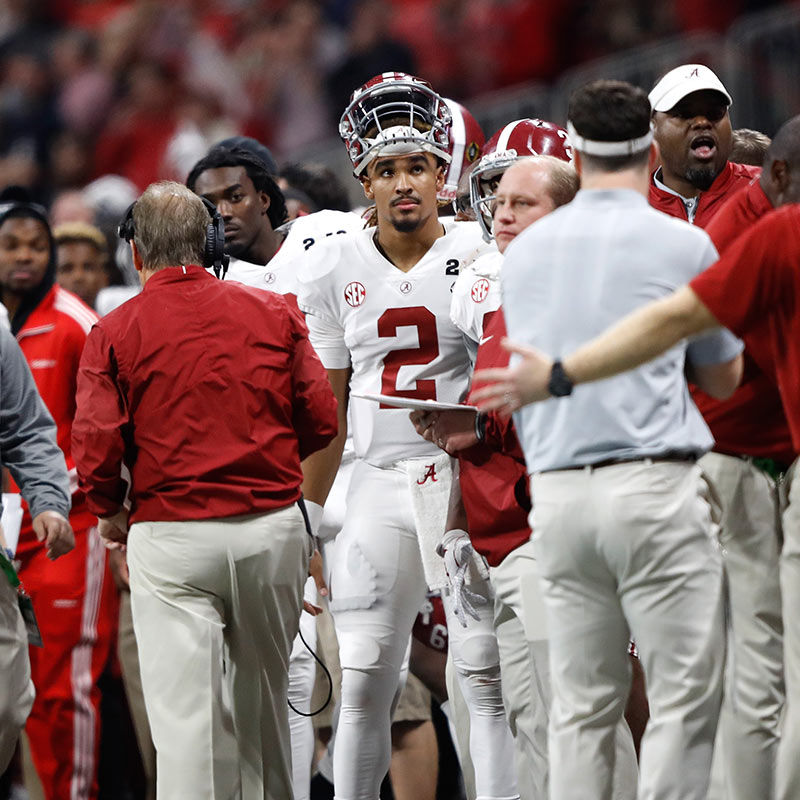Jalen Hurts is special.
In two years as the quarterback for the Alabama Crimson Tide, Hurts has played in as many National Championship games as games he has lost—two title games and two losses in his entire college football career.
While Hurts’ play has been exceptional at Alabama, there have been vocal critics throughout his tenure. Those voices grew louder this year with the presence of Tua Tagovailoa, a true freshman quarterback phenome, backing up Hurts. Though Hurts started all twelve regular season games for the Tide, Tagovailoa saw playing time in mop-up throughout the season.
Before Monday night’s National Championship game, many analysts talked of the possibility of Tagovailoa taking over for Hurts if the Tide failed to score early, and at halftime those predictions came true.
As the second half began it was not Hurts under center for Alabama, but Tagovailoa who took the field. Images of Hurts standing on the sideline watching were shown throughout the remainder of the game.
While Hurts would not influence the outcome of the contest on the field, his actions on the sideline would demonstrate something much more profound, and in the end more important, than the ability to put together a game winning touchdown drive. From the sideline, the star quarterback would show us what made him truly special, at least on this night when the lights shined brightest on Alabama football.
Whether intentionally or not, Hurts illustrated Paul’s admonition to at all times and under any circumstances choose the path of Christ in our relationships with others.
Demonstrating Humility
When Paul writes to the believers in Philippi, he encourages the Philippians in their faith and challenges them to center their lives on Jesus. Paul says that the Philippians should mirror Jesus, and have the same mind as the Messiah. One way to do this is through humility. He writes, “Do nothing from selfish ambition of conceit, but in humility regard others as better than yourselves. Let each of you look not to your own interests, but to the interests of others” (Phil. 2:3-4).
There are two important things to note from this passage. First, Paul is not interested in the talk of the Philippians—their hope to act in a certain way—but rather how they actually live out their faith on a daily basis. While our works will not save us, we embody our faith for all to see when we live out what we believe. If we only speak of teamwork and our individual statistics not mattering yet we do nothing to demonstrate the truth of this statement, we are left with only empty words that are meaningless.
Second, Paul’s words ask us to place others before ourselves. Paul’s request runs against the narrative we hear so often about performance in sport. We are told it is about us succeeding with the spotlight shining brightest on ourselves. While we want our team to win, we want to be at the center of this victory. Paul challenges our notions of how we view ourselves and others saying it is not the most talented that is best, but the person who places others before themselves who truly understands what life is about. Placing others first does not make a person weak or not competitive; rather it shows that they are seeking to have the same mind as Jesus Christ.
What Made Jalen Hurts Special That Night
As the camera panned to Jalen Hurts at the beginning of the second half many waited to see how the quarterback would react to being benched. Would he pout on national television? Isolate himself from his teammates on the sideline? Yell at his coaches or ignore Tagovailoa’s existence? How would he respond?
Hurts did none of this, rather he stood confidently on the sidelines watching every play, encouraging Tagovailoa during every TV commercial and timeout, and celebrating with his teammates as they won another national title. When interviewed by ESPN’s Tom Rinaldi postgame, Hurts shared his excitement at winning a national championship and praised the true freshman who replaced him.
It would have been easy for Jalen Hurts to respond in a different fashion, and like so many other players in similar situations, vents his frustration at the decision made by his coaches or passive-aggressively say how happy he was for Tagovailoa. Instead, he demonstrated what—at least on this night and in this moment—makes Jalen Hurts truly special.
Jalen Hurts is not a special athlete because he leads the Crimson Tide to National Championship games.
He is not special because he has as many losses in his college career as starts in the national title game.
He is not special because he is the starting quarterback of the best team in the nation.
Jalen Hurts is special because he does not view himself as the star.
He is special because in the midst of his personal disappointment he didn’t merely talk about putting his team first. Rather, he lived out his commitment to his team on the biggest stage for all to see.
And Jalen Hurts is special because his choices that night challenge us to do the same thing.
I don’t know whether Jalen Hurts follows Jesus or not, but for those who do, being humble doesn’t have to mean you are weak, unable to compete, or that you want it less than others. Being humble means you desire to mirror the image of Christ more than you desire to sit in the spotlight. Whether in a pickup game with friends or at the National Championship, we are encouraged to mirror Jesus in all circumstances—witnessing to the hope we have in Christ, and challenging others to do likewise.
For those who have ears to hear, that will always be more special than any individual glory or accolade, and it will definitely last longer than the performance praise of other people.













